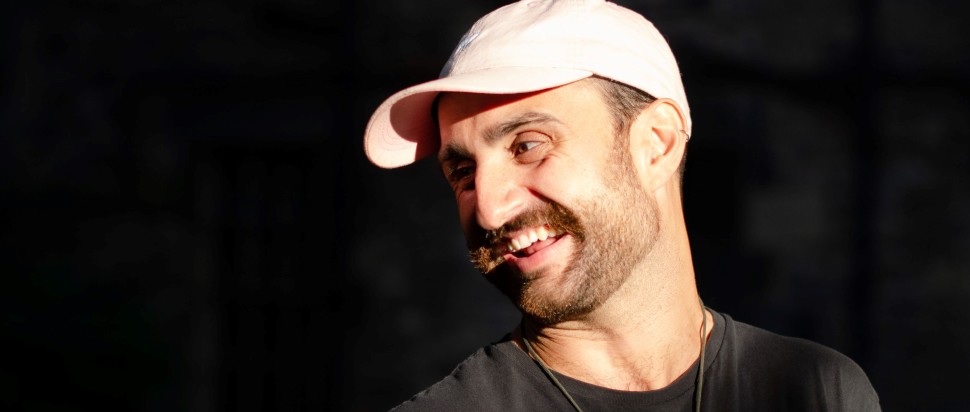Niall Moorjani on their Edinburgh Fringe shows
We meet storyteller Niall Moorjani to learn more about the three plays – The Girls and the Dragon, Mohan: A Partition Story and A Fairie Tale – they're bringing to the Edinburgh stage this August
“Queer people aren’t just their struggle,” Niall Moorjani tells me over video chat, “There’s so much joy in being, like, ‘This person is queer. Their problem is that they don’t have enough beans.’” It’s this sort of queer whimsy that surfaces in varying degrees in each of Moorjani’s three Edinburgh Fringe offerings this year. Moorjani, a mixed South Asian and Scottish storyteller and theatremaker, is hoping to bring a taste of their own personal brand of playfulness to conversations about queerness and race.
I first encountered Moorjani’s work through their Fringe of Colour submission, Selkie. The short poetry film was a breathtaking introduction to the auspicious marriage between fairytale and queer self-discovery. Moorjani’s work since then has always embraced the melancholic aspects of whatever it addresses while showing audiences that play is still possible.
This year, Moorjani brings a children’s show to the Scottish Storytelling Centre. The Girl and the Dragon is a delightfully fun fairytale about just what it promises. In it, a young girl embarks on a legendary quest to defeat a great and terrible dragon, only to discover that not everything is as it seems.
Simultaneously, Moorjani returns to their storytelling roots with Mohan: A Partition Story.
The show is performed by Moorjani and two live musicians. Together, they weave together stories from Moorjani’s own memories with the story of their grandfather, Mohan, who lived through the Partition of India in 1947. We will cross the 75th anniversary of Partition on 15 August, making this piece all too timely. The show is a sardonically witty and deeply heartfelt account of a period of history that, especially in its 75th anniversary year, deserves our attention.
Moorjani’s third and final Fringe offering is A Fairie Tale, showing at Lighthouse Bookshop. The piece explores gender and race in Scotland through the lens of a whimsical and weird fairy world. Moorjani describes the show as a “deeply queer space for people of colour” – one that both teaches and offers empathy.
“Growing up in Dundee, in particular, we didn’t even know that we could talk to each other about the racism we were experiencing,” Moorjani says, “That’s how gaslit we were. We genuinely didn’t realise that that’s something we had a shared experience of. It wasn’t even something we knew we were going through. Racism in Scotland is such an interesting thing in how silent it is and how quiet it is. It loves to pretend that its English relations are so much worse, and therefore it has nothing to look at. And there’s a real danger in that, so to be part of creating work that challenges that space and hopefully, as cliché as it is, that a younger version of me would love to have seen. A current version of me is often writing in the hope that one day I’ll get there.”
For Moorjani, representing the breadth and depth of queer experience must include euphoria.
“Being queer isn’t just about suffering. The reason I’m non-binary is that when I worked that out, the main overriding thing was joy. When I put on a dress, the main overriding thing I feel is joy. The world makes that hard, but the core of it is joy – is me feeling much closer to myself. I want to explore [difficult moments], but I don’t want the end result to be, ‘The world’s terrible and it’s all awful and it’ll never be good,’ because I’ve got to live in that! If you’re gonna use your imagination, you might as well imagine a happier version of reality for yourself. And I think this is where stories are so powerful; there is such power in the lessons that can come from them, because they’re so simple. They’re so direct. There is so much that can be learned from them, and I think they provide examples of what the world could be.”
Even Mohan: A Partition Story invites audiences to laugh at the dark absurdity of it all. Moorjani says, “Both Mohan and A Fairie Tale are actually looking at some of the more difficult stuff, but definitely not without the joy. Mohan very deliberately has moments of comedy in it that were very hard to find. There is genuine absurdity in how it happened, and it’s kind of funny. It’s not funny, it’s awful, but it’s so wildly absurd.”
Finding ways to temper tragedy with joy was crucial to Moorjani while they were adapting Mohan for the Fringe.
“I rightly get accused of being quite optimistic and hopeful in most of my work, Mohan being a contrast to that, I think. But it’s more hopeful now, which I’m happier with. To me, in these fantastical or fictionalised spaces where you’re choosing to imagine, I’m gonna imagine the hopeful one. Because that’s the world I’ve got to live in – that I hopefully get to live in one day.”
Mohan: A Partition Story, Scottish Storytelling Centre, 4-16 Aug (not 10, 11 or 15), 3pm, £10-12
The Girl and the Dragon, Scottish Storytelling Centre, 4-21 Aug (not 10, 17-19), 10am, £8-10
A Fairie Tale, Lighthouse Bookshop, 18-21 Aug, 8pm
